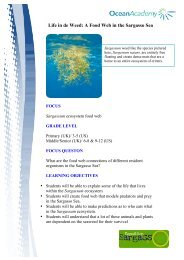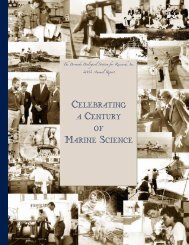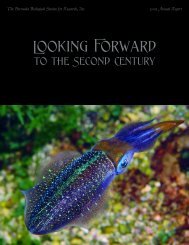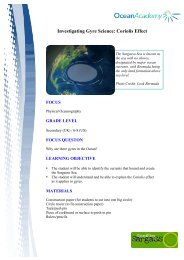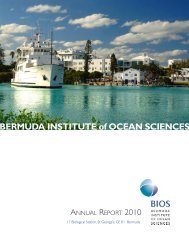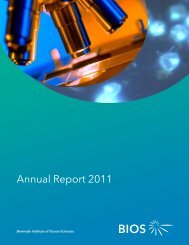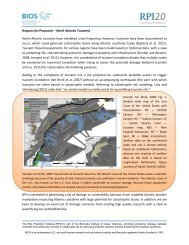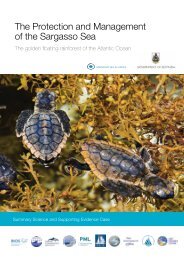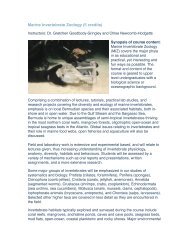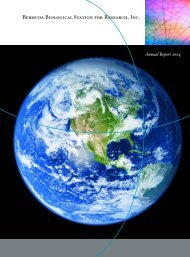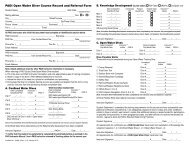BBSR 2001 Annual Report - Bermuda Institute of Ocean Sciences
BBSR 2001 Annual Report - Bermuda Institute of Ocean Sciences
BBSR 2001 Annual Report - Bermuda Institute of Ocean Sciences
- No tags were found...
Create successful ePaper yourself
Turn your PDF publications into a flip-book with our unique Google optimized e-Paper software.
Searching the Pastfor Tomorrow’sForecastsCollaborative problem solving is the foundation <strong>of</strong> <strong>BBSR</strong>’s RiskPrediction Initiative (RPI). Established in 1994, RPI is an innovativescience-business partnership that helps businesses betterunderstand, assess and manage climate-related risks.With funding from and activeinvolvement by seven insurance orreinsurance companies, RPI hascovered a range <strong>of</strong> issues, includingforecasts <strong>of</strong> El Niño, Atlantichurricanes and European windstorms.There is perhaps no place better than<strong>Bermuda</strong> for such a program, given<strong>BBSR</strong>’s long-term time-series <strong>of</strong> climatemeasurements (see article by Dr. NickBates on page 10) and the strong globalreinsurance industry presence on theisland.In addition to tapping into theresident expertise <strong>of</strong> <strong>BBSR</strong>’s faculty,RPI also works closely with leadingclimate scientists from around theworld. <strong>BBSR</strong> Associate ResearchScientist Dr. Rick Murnane, whomanages the RPI science program,describes how two workshopsorganized by RPI in <strong>2001</strong> provided aforum for a better understanding <strong>of</strong>climate risks.TWO RECENT RPI workshopsfocused on the improvement andconsolidation <strong>of</strong> historical records andarchives that are analogous to the longtermtime-series measurements carriedout by <strong>BBSR</strong> scientists. One workshopconcerned tropical cyclone records heldby countries affected by tropicalcyclones in the Northwest Pacific. Theother workshop examined temperatureand precipitation records collected bythe U.S. National Weather Service.The importance <strong>of</strong> tropicalcyclone, weather and climate recordsextends beyond scientific studies <strong>of</strong>climate change and the carbon cycle tobusinesses trying to reduce their risk <strong>of</strong>loss from tropical cyclone landfall orweather extremes. Records <strong>of</strong> the trackand intensity <strong>of</strong> past tropical cyclonesprovide crucial information fordeveloping estimates <strong>of</strong> hurricane andtyphoon landfall probabilities. Archives<strong>of</strong> temperature and precipitation atnumerous weather stations in theUnited States can yield estimates <strong>of</strong> therisk <strong>of</strong> extreme heat, cold, drought andflood. Improvements andenhancements to these records willhelp RPI sponsors better assess theprobabilities <strong>of</strong> tropical cyclone landfalland <strong>of</strong> extremes in temperature andprecipitation, leading to better businessdecisions.The November workshop wascosponsored with the U.S. NationalWeather Service and titled “Workshopon the Potential Development <strong>of</strong> aUnified Northwestern Pacific (NWPAC)Tropical Cyclone Best-Track Data Set.”Representatives from the meteorologicalagencies <strong>of</strong> nine countries gatheredin Hawaii to discuss the feasibility,



